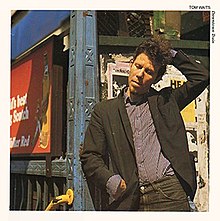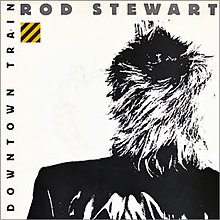From Wikipedia, the free encyclopedia
1985 single by Tom Waits
"Downtown Train " is a song by Tom Waits released on his album Rain Dogs Jean-Baptiste Mondino , it features boxer Jake LaMotta and Neith Hunter .
Rod Stewart version [ edit ] Rod Stewart recorded a cover version that became a number-three hit on the Billboard Hot 100album rock and adult contemporary charts . The song went to number one in Canada and made the top ten on the UK Singles Chart in 1990. Stewart received a Grammy nomination for the song in the category Best Male Pop Vocal performance .[ 3] Vagabond Heart
Bob Seger also recorded a version of "Downtown Train" in 1989 before Rod Stewart recorded his version. Seger claimed that on a trip to London he told Rod Stewart he had recorded a version of "Downtown Train" and then one month later Rod Stewart recorded his version. Rod Stewart and his management have denied that Rod Stewart stole the idea from Bob Seger. Seger decided not to release his version in 1989 as originally planned but instead re-recorded it in 2011 for his album Ultimate Hits: Rock and Roll Never Forgets [ 4]
Patty Smyth released a version in 1987 that reached number 95 on the Billboard Hot 100David Fincher .
Everything but the Girl 's acoustic cover, also recorded in 1989 and later put on the reissue of The Language of Life final episode of the long-running series How I Met Your Mother [ 5]
Patty Smyth version [ edit ] Rod Stewart version [ edit ]
^ "The 30 Best Tom Waits Songs" . Spin . Retrieved December 4, 2024 .^ "Rod Stewart - Downtown Train/The Killing of Georgie (Part I And II)" . 45cat.com. Retrieved September 11, 2020 .^ Hyatt, Wesley (1999). The Billboard Book of #1 Adult Contemporary Hits (Billboard Publications), page 355.
^ "Bob Seger to Debut 'Downtown Train' Single Monday" . Billboard ^ Lee, Ashley (April 1, 2014). " . The Hollywood Reporter Archived from the original on August 13, 2017. Retrieved August 13, 2017 . ^ "Patty Smyth Chart History (Hot 100)" . Billboard ^ "Patty Smyth Chart History (Mainstream Rock)" . Billboard ^ "Rod Stewart – Downtown Train" . ARIA Top 50 Singles . Retrieved April 9, 2019.
^ "Top RPM Singles: Issue 6644 ." RPM Library and Archives Canada . Retrieved April 9, 2019.
^ "Top RPM Adult Contemporary: Issue 6641 ." RPM Library and Archives Canada . Retrieved April 9, 2019.
^ "Eurochart Hot 100 Singles" (PDF) . Music & Media . Retrieved August 16, 2020 .^ Nyman, Jake (2005). Suomi soi 4: Suuri suomalainen listakirja (in Finnish) (1st ed.). Helsinki: Tammi. ISBN 951-31-2503-3 ^ "The Irish Charts – Search Results – Downtown Train" . Irish Singles Chart . Retrieved April 9, 2019.
^ "Tipparade-lijst van week 9, 1990" (in Dutch). Dutch Top 40 . Retrieved March 20, 2023 .^ "Rod Stewart – Downtown Train" (in Dutch). Single Top 100 . Retrieved April 9, 2019.
^ "Rod Stewart – Downtown Train" . Top 40 Singles . Retrieved April 9, 2019.
^ "Official Singles Chart Top 100" . Official Charts Company . Retrieved April 9, 2019.^ "Rod Stewart Chart History (Hot 100)" . Billboard ^ "Rod Stewart Chart History (Adult Contemporary)" . Billboard
^ "Rod Stewart Chart History (Mainstream Rock)" . Billboard ^ "Offiziellecharts.de – Rod Stewart – Downtown Train" (in German) . GfK Entertainment charts . Retrieved April 9, 2019.
^ "Top 100 Hit Tracks of 1990" . RPM Library and Archives Canada . Retrieved April 9, 2019 .^ "Top 100 Adult Contemporary Tracks of 1990" . RPM . Library and Archives Canada. Retrieved April 9, 2019 .^ "Billboard Top 100 – 1990" . Billboardtop100of.com . Retrieved April 10, 2019 .^ "Adult Contemporary Songs – Year-End 1990" . Billboard . Retrieved March 9, 2021 .^ "Bob Seger Chart History (Adult Contemporary)" . Billboard
^ "Adult Contemporary Songs – Year-End 2011" . Billboard . Retrieved September 28, 2019 .
Studio albums Live albums Soundtracks Compilations Notable songs Tours Musicals Related articles
1970s 1980s 1990s 2000s 2010s
The System albums Seger solo albums The Silver Bullet Band albums Live albums Compilation albums Singles Related articles
Studio albums Singles Related articles


